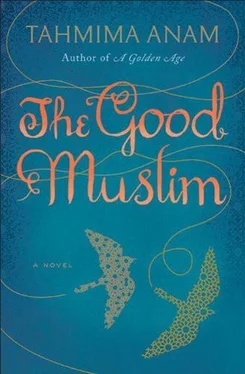‘I am so glad you have returned. I have thought of you often.’ He passed Joy a small green glass.
‘I have thought of you too.’
It was like the tender meeting of two old lovers. They were awkward around one another, each looking into his glass of lemonade. Joy turned the conversation to ordinary things. ‘I drove a taxi for the first five years, while I completed my degree. It wasn’t bad,’ he said. ‘I met a lot of interesting people. They told me everything, like I was a priest.’
‘So you two have something in common,’ Maya said, wishing they would stop staring so intently at everything but each other.
They ignored her. ‘Why did you come back?’ Sohail asked, holding out his hand to refill Joy’s glass.
‘Everyone asks me that. Because it isn’t so great.’
‘Sometimes we believe something is important, but it turns out to be insignificant.’ Sohail pulled the cap from his head, revealing a full head of hair in black and grey tones that matched his beard. He ran his fingers through it briefly, then returned the cap to its place, fitting and tightening it around his crown. ‘There were things I held on to, for a very long time. Too long.’
Maya wondered if he was about to talk about the war; she leaned forward to hear him. Then Joy said, ‘I didn’t go to America for money. I went for other reasons.’
She saw Sohail debating whether to ask what his reasons were, then deciding not to. ‘Did you get married?’ Sohail asked suddenly.
‘Yes, how did you know?’
‘A man should marry. You have children?’
‘No.’
‘You should have children.’
‘I’m divorced.’
Sohail nodded. ‘Why don’t you marry her?’ he asked.
It took Maya a moment to realise what Sohail meant. She thought he might burst out laughing any moment, hold his stomach and apologise. But he didn’t. Instead, he continued, ‘Why not? She’s getting old now.’
‘We don’t love each other,’ Maya said. ‘Don’t you believe in love any more?’
Joy took a long sip of lemonade. ‘Actually, Sohail, you’re right, I should get married. But this one won’t even let me take her out for phuchka.’
‘Well, there are others.’
‘Yes,’ Maya said, ‘the world is full of desperate women.’ She was being unpleasant, she knew; she should have treated it casually, said something light and funny. Always too serious.
There was an awkward silence. Maya wanted to get up, but her legs were heavy, and she wanted to know what they would say to one another next, whether Joy would ask the question she knew he wanted to ask. What was Sohail doing here, in this shack on top of his mother’s house, raising a son without love, in this beard, this costume, this posture of calm? Instead, he asked, ‘Do you think often about it?’
‘About what?’
‘About the war — those villages we saved, and the ones we didn’t.’
Sohail didn’t reply.
‘And my brother, do you remember him?’
‘I remember him every day,’ Sohail said. ‘Your brother and your father both. And you. You saved my life, Joy. I will never forget that.’
Joy had been captured while her brother ran free.
‘It wasn’t me,’ Joy said.
‘God is great.’
That was not what Joy had meant. What he had meant was, it was just a matter of chance, that the soldiers had found him and not Sohail. They both fell silent, remembering that long November night. ‘Why did you do it, Sohail?’ Joy asked finally. ‘What made you like this?’
Maya thought Sohail would have a quick and practised response, something about how his path was the natural one, that the question was not why he had become what he had become, but why Joy hadn’t joined him. But instead he appeared hesitant, almost nervous, cupping the glass in his palm. He seemed to have no answer for Joy.
Joy turned his face away and caught Maya’s eye. She had thought, until that moment, that he had been fooling around, that he might like to trap Sohail into saying something ridiculous, but now she realised he was angry, very angry, as though Sohail’s being there, his having become who he was, had something to do with the death of his brother.
‘These are mysteries that cannot be explained in brief. Why don’t you come to the taleem? We can speak about it then.’
The man returned and spoke softly into Sohail’s ear. ‘Khadijama asks if your guests will stay long.’
‘Tell her they will be going soon, inshallah.’
It was time to leave; there appeared nothing left to say. Maya saw the disappointment in Joy’s face. She knew that Joy must have thought often of Sohail, while he was in jail, and later, in New York, when he drove that taxi. She suspected that taxi-driver Joy had not elaborated on his gun-wielding, dogs-at-his-heels past; that he had taught himself the alien politeness of you have a good day now and where to, ma’am , learned to discuss the weather as though it were both a suitable topic for discussion and a way to avoid discussion altogether.
But in that foreign city, where he had been a cabbie, not a freedom fighter, where his most heroic act had been to run the occasional red light — and with the guilt of surviving the death of his brother, propping him up against a tree while the shelling approached, watching the blood escape from his body like water out of a mountain, long behind him — he must have thought of Sohail, thought about writing letters and making long-distance calls, turning their friendship into an ordinary one of traded news. But he hadn’t been able to. And now this, this mystery. Joy wouldn’t have known what to expect, though perhaps there was some part of him, some arrogance, which might have led him to believe he could catch a glimpse of it in action, cup it between his hands, because no one, after all, knew Sohail as he did, no one else had shaken the fleas out of his bread, or picked the lice out of his hair, or run with him through the smoke and thunder of bullets. No one else had gone to jail while he had run free.
Joy stood to take his leave. Sohail stood as well. They embraced. ‘You will always be a brother to me,’ Sohail said, his eyes bright.
‘And you to me,’ Joy replied. The anger had left his face, replaced now with something else — a kind of longing, even envy. Perhaps there was a feeling at the back of Joy’s throat, the feeling that this man slept easier than he did, that he didn’t need to suck the marrow out of his memories or escape to a tall city to get away from them. Sohail didn’t seem to mind, as he stroked the beard that protruded from his chin, that it was threaded with grey; and he didn’t seem to mind about the shabbiness of his house, the stains on the carpets, the cement that scratched your feet as you removed your shoes to enter his room. He didn’t seem to mind about anything at all. Not in this world.
‘Khoda Hafez,’ Joy said, his hands sandwiched again between Sohail’s.
‘Come again soon.’ Sohail turned around, and Maya suspected that she and Joy were forgotten already, trumped by the tasks that lay ahead — prayer, sermon. The afterlife.
They descended the stairs in silence, and when they reached the bottom, Maya was reluctant to let Joy get into his car and drive away. She knew he was feeling something of what she was feeling, unsettled by the meeting with her brother, questions asked but not answered. She decided to ask one of her own. ‘Tell me about your time in jail,’ she said. ‘I want to know what happened to you.’
*
Built with its back to the river, Dhaka city had little to recommend it. The roads were narrow and flooded easily, with no grand avenues or boulevards or vistas to make the heart ache and the poet draw out his pen. Still, after the war, it was awash with people who had nowhere to go, and with even more who had nothing to eat. The smell of burned thatch hung in the air in the villages, so they came to the city to escape it, and remained, as had so many before them, turning their backs on one violence to face the possibility of another. And yet they chose those streets, dusty and narrow as they were, over the river that closed around them every monsoon, and over a life spent staring up at the sky, hoping for rain this week, sun the next, their feet wet from the fields, and backs aching from bending over the paddy.
Читать дальше












